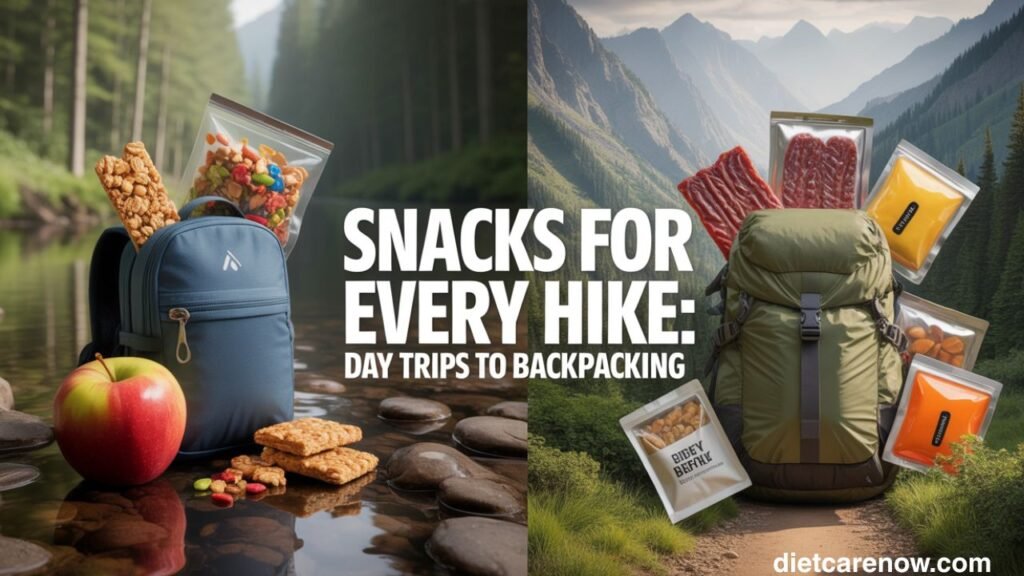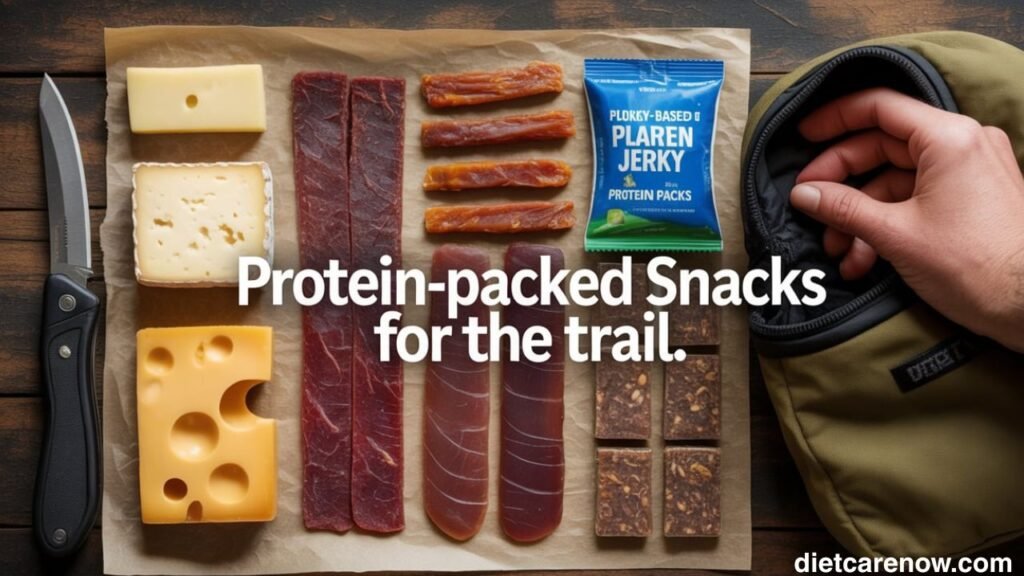When you head out on a hike, what you bring in your backpack matters almost as much as the shoes on your feet. Food isn’t just something to enjoy on a break; it’s the fuel that keeps your body moving over miles of rugged trail. A good hiking snack can mean the difference between feeling energized and strong or hitting that dreaded wall of fatigue halfway through.
The goal is simple: give your body steady energy, keep yourself hydrated, and bring food that actually tastes good. If your snacks don’t check all three boxes, chances are you’ll regret your choices by the second mile. Let’s look at what makes a hiking snack worth carrying and explore some of the best options for different types of hikes.
Importance of Fueling Your Body During Hikes
Hiking is more demanding than it looks. Even a moderate trail can burn anywhere from 300 to 600 calories per hour, depending on your pace and the terrain. That’s why regular refueling is so important.
When your body runs low on glycogen (its stored energy), you’ll start to feel sluggish, dizzy, or even irritable. Snacks act like quick refills for your energy tank, helping your muscles keep up with the demands of the trail. Eating small portions every hour or two also helps maintain stable blood sugar levels, which means fewer crashes and a more enjoyable experience overall.
Water is equally critical. Dehydration reduces performance and can increase your risk of heat exhaustion. Pairing your snacks with steady hydration will keep you going stronger and longer.
Also read: /peanut-butter-banana-chocolate-smoothie/

Balancing Energy, Hydration, and Taste
It’s tempting to just throw a candy bar in your backpack and call it good. But smart snacking is about balance. The ideal hiking snack should:
- Provide quick energy (from carbs)
- Keep you full longer (from protein and healthy fats)
- Be hydrating or pair well with water
- Taste good enough that you’ll actually eat it
If you don’t enjoy the taste, you won’t eat enough, and that leads to fatigue. Good hiking snacks should be both practical and satisfying.
What Makes a Snack Good for Hiking?
When choosing snacks for the trail, think about four key factors:
- Portability – Snacks should be easy to pack and eat on the go.
- Shelf Life – You want foods that won’t spoil quickly in your backpack.
- Nutrition – Aim for snacks with a balance of carbs, protein, and fats.
- Weight – Lighter is better, especially for long or steep hikes.
A balanced snack might look like trail mix (carbs from dried fruit, protein from nuts, fats from seeds) or a nut butter packet with crackers. These combinations help your body access both quick and sustained energy.
Lightweight vs. Heavier Snacks: Choosing Based on Hike Duration
Snacks for Short Day Hikes
If you’re only out for a couple of hours, focus on lightweight snacks that give quick energy without weighing you down:
- Fresh fruit like apples or grapes
- Granola bars
- A small bag of trail mix
Snacks for Multi-Day or Backpacking Trips
For overnight or multi-day hikes, shelf-stable, calorie-dense foods are best:
- Jerky and cheese sticks
- Dehydrated meals
- Nut butter pouches
- Electrolyte packets for water
The longer the hike, the more you’ll want snacks that pack more calories per ounce while staying fresh.
Trail Mix: The Classic Hiking Snack
Trail mix has been a hiker’s go-to for decades, and for good reason. It’s customizable, lightweight, and calorie-dense.
Customizing Your Trail Mix
Start with a base of nuts like almonds, peanuts, or cashews for protein and healthy fats. Add dried fruits such as raisins, cranberries, or apricots for quick carbs. A touch of chocolate chips or M&Ms provides a sugar boost and keeps things fun. Seeds like pumpkin or sunflower add extra crunch and nutrients.
Best Combinations for Energy Boost
- Almonds, dried cranberries, and dark chocolate chunks
- Cashews, raisins, and coconut flakes
- Peanuts, banana chips, and pretzel bites
Energy Bars and Protein Bars
Store-Bought vs. Homemade
Energy bars are convenient, but not all are created equal. Some are loaded with sugar, while others focus more on protein. Look for bars with at least 10 grams of protein, moderate sugar, and whole ingredients like oats and nuts.
Homemade bars let you control the ingredients. With oats, honey, nut butter, and seeds, you can easily whip up a batch before your trip.
How to Choose the Right Bar
- Short hikes: Higher-carb bars for quick energy
- Long hikes: Protein-rich bars for sustained energy
- Hot weather: Bars without chocolate or coatings that melt

Fruits for the Trail
Fresh Fruits vs. Dried Fruits
Fresh fruit is refreshing, but it’s heavier and can spoil. Apples, oranges, and grapes are solid options for day hikes. Dried fruit, on the other hand, is lighter and lasts longer, making it better for multi-day trips.
Best Fruits That Don’t Spoil Quickly
- Apples
- Oranges
- Bananas (eat early in the hike)
- Dried apricots, dates, and mango
Vegetable-Based Hiking Snacks
Dehydrated Veggie Chips
Kale chips, beet chips, and sweet potato chips are crunchy, flavorful, and lightweight. You can buy them or make your own with a dehydrator.
Fresh Veggie Options
Carrot sticks, celery, and snap peas are great for short hikes. Pair them with hummus or a nut butter pack for added energy.
Cheese, Jerky, and Protein-Packed Options
Shelf-Stable Cheese Varieties
Hard cheeses like Parmesan or aged cheddar last longer without refrigeration. String cheese is another good option for shorter trips.
Jerky Choices
Beef, turkey, or salmon jerky are high in protein and lightweight. For plant-based hikers, mushroom or soy jerky works well too.
Nut Butters and Portable Protein Packs
Nut butters are calorie-dense and satisfying. Single-serve packs from brands like Justin’s or RX are perfect for the trail.
Pairing Ideas
- Almond butter with apple slices
- Peanut butter with crackers
- Cashew butter with banana chips

Hydrating Snacks and Electrolyte Boosters
Snacks that support hydration are often overlooked but can be game-changers.
- Coconut water powder mixes easily into your water bottle.
- Electrolyte chews or gels help replace sodium lost through sweat.
- Fruits with high water content like oranges or watermelon slices (great for day hikes).
Homemade Hiking Snack Ideas
Making your own snacks saves money and lets you skip preservatives.
- DIY granola bars with oats, honey, and dried fruit
- No-bake energy bites with dates, peanut butter, and cocoa
- Dehydrated fruit leather from pureed berries or mango
Snacks for Kids and Family Hikes
Hiking with kids calls for fun, mess-free snacks.
- Apple slices with peanut butter
- Trail mix with colorful add-ins like mini marshmallows
- Whole-grain crackers with cheese
For allergy-friendly options, sunflower seed butter, rice cakes, and gluten-free pretzels are great substitutes.
Vegan and Gluten-Free Hiking Snack Options
Plant-Based Protein Sources
- Roasted chickpeas
- Edamame packs
- Vegan jerky
Gluten-Free Options
- Gluten-free granola bars
- Rice crackers
- Quinoa-based snacks
Packing and Storing Hiking Snacks
Even the best snacks won’t help if they get crushed or spoiled.
- Use reusable silicone bags to keep snacks fresh and reduce waste.
- Store soft items (like fruit or bars) in a small plastic container.
- Keep chocolate or melt-prone items in the middle of your pack to avoid direct heat.
- Divide portions into snack-size bags so you don’t eat everything at once.

Conclusion: Smart Snacking for the Trail
Good hiking snacks keep you fueled, hydrated, and happy on the trail. The right mix of carbs, protein, and fats can make your hike more enjoyable and prevent fatigue. Think about your trip length, weather, and personal preferences when choosing what to pack.
Don’t be afraid to experiment with different combinations. Maybe you’ll find that homemade granola bars give you steady energy, or that a mix of jerky and dried fruit hits the spot on longer trips. The best hiking snacks are the ones you’ll actually look forward to eating.
So next time you lace up your boots, pack smart, fuel well, and enjoy every step of the trail.

